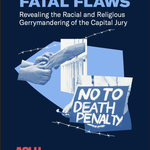A new report from the ACLU documents how the process of selecting juries for death penalty cases systematically excludes Black prospective jurors, women, and people of faith, fundamentally undermining the constitutional promise of a trial by a jury of one’s peers. The report, Fatal Flaws: Revealing the Racial and Religious Gerrymandering of the Capital Jury, examines the practice of “death qualification,” a requirement that potential jurors must be willing to impose a death sentence to serve on a capital jury. Drawing on research from multiple states, the report shows how this process creates juries that are whiter, more conviction-prone, and less representative of American communities.
“The Constitution guarantees that every person accused of a crime has the right to be tried by a jury of their peers, but that promise is by definition denied for people facing the death penalty.”
To serve on a capital jury in the United States, an individual must first demonstrate his willingness to potentially sentence a defendant to death. This process, while intended to ensure impartial deliberation, removes specific demographic groups from capital jury pools. Fatal Flaws reveals that this filtering disproportionately impacts communities of color, particularly Black people who historically have expressed higher rates of opposition to the death penalty. The exclusion is even more pronounced for Black women. Individuals of faith, particularly Quakers, Buddhists, and Catholics, are also disqualified from juries at high rates because of their religious values and beliefs.
The report draws attention to multiple studies that have documented the discriminatory impact of the death qualification process. A 2016 study in California that polled 500 jury-eligible adults in Solano County, California, found that Black people and women were more likely than their white or male counterparts to be excluded from selection because of death qualification. 37% of Black respondents were excluded because of their opposition to sentencing someone to death, while just 20% of white respondents were excluded. The same study found that while women made up just under half of the respondents (49%), they accounted for 63% of those excluded because of their opposition to capital punishment. A 2022 analysis of ten capital trials in Wake County, North Carolina found the death qualification process disproportionately excluded religious jurors. 20% of prospective jurors who identified as religious were removed because of death qualification, while only 12% of jurors who identified as not religious were removed. On average, 14 % of all potential jurors are removed during death qualification, but 27% of Catholic prospective jurors were removed.
Fatal Flaws argues that death qualification creates a constitutional paradox where individuals facing the death penalty have juries that are less representative of their communities than defendants facing lesser punishments. Brian Stull, deputy director of the ACLU Capital Punishment Project, considers the practice a violation of constitutional rights: “The resulting juries do not reflect our communities, convict more frequently, and are composed to ignore evidence favoring a life sentence in violation of our Constitution.” Mr. Stull concludes, “Justice depends on equal access to the jury box. We must demand an end to this cycle of discrimination and exclusion once and for all.”
The report concludes with several recommendations. It urges state legislatures to pass legislation preventing jury disqualification based on death penalty opposition in capital cases; askes courts to reexamine the justification for the continued use of death qualification, particularly in states where they are not bound by law to use the process; calls on prosecutors to decline questioning prospective jurors on their support or opposition of the death penalty; and encourages defense attorneys to challenge the practice of death qualification with evidence of its discriminatory effects.
Fatal Flaws: Revealing the Racial and Religious Gerrymandering of the Capital Jury, ACLU, June 24, 2025; New ACLU Report Finds Racial and Religious Discrimination in Death Penalty Jury Selection, ACLU, June 24, 2025.



